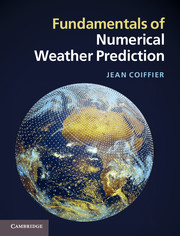Book contents
- Frontmatter
- Contents
- Foreword to the French Edition
- Foreword to the English Edition
- Preface
- Acknowledgments
- Partial list of symbols
- 1 Half a century of numerical weather prediction
- 2 Weather prediction equations
- 3 Finite differences
- 4 Spectral methods
- 5 The effects of discretization
- 6 Barotropic models
- 7 Baroclinic model equations
- 8 Some baroclinic models
- 9 Physical parameterizations
- 10 Operational forecasting
- Appendix A Examples of nonhydrostatic models
- Further reading
- References
- Index
1 - Half a century of numerical weather prediction
Published online by Cambridge University Press: 05 June 2012
- Frontmatter
- Contents
- Foreword to the French Edition
- Foreword to the English Edition
- Preface
- Acknowledgments
- Partial list of symbols
- 1 Half a century of numerical weather prediction
- 2 Weather prediction equations
- 3 Finite differences
- 4 Spectral methods
- 5 The effects of discretization
- 6 Barotropic models
- 7 Baroclinic model equations
- 8 Some baroclinic models
- 9 Physical parameterizations
- 10 Operational forecasting
- Appendix A Examples of nonhydrostatic models
- Further reading
- References
- Index
Summary
Introduction
Numerical weather prediction (NWP) is a very young discipline that developed essentially in the second half of the twentieth century with the continual benefit of advances in computing. The techniques implemented are used to solve equations describing the behaviour of the atmosphere, that is, to numerically compute future values of the atmosphere’s characteristic parameters from initial values that are known from meteorological observations.
The equations used are the general equations of fluid mechanics that were already well established by the early twentieth century and to which certain simplifications are applied. Those simplifications are justified by the orders of magnitude of the various terms in the specific instance of the Earth’s atmosphere and by the scales to be described. Computers are essential for solving these systems of nonlinear equations, which, in the general case, cannot be solved analytically.
Information
- Type
- Chapter
- Information
- Fundamentals of Numerical Weather Prediction , pp. 1 - 14Publisher: Cambridge University PressPrint publication year: 2011
